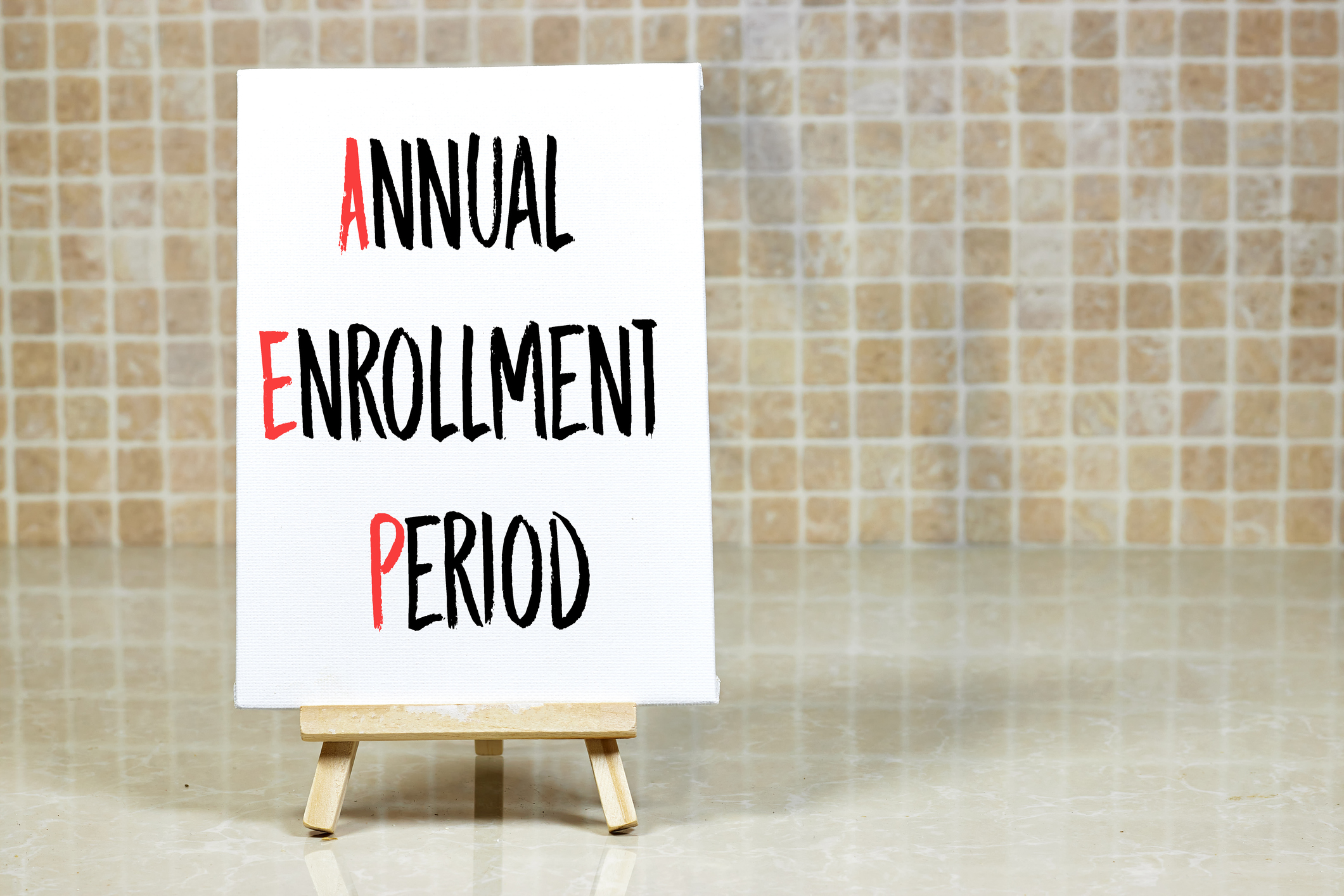When Is Medicare Open Enrollment?
During the annual enrollment period each fall, you can select a new Medicare Advantage or Part D plan or switch back to original Medicare.

Jackie Stewart

Profit and prosper with the best of Kiplinger's advice on investing, taxes, retirement, personal finance and much more. Delivered daily. Enter your email in the box and click Sign Me Up.
You are now subscribed
Your newsletter sign-up was successful
Want to add more newsletters?

Delivered daily
Kiplinger Today
Profit and prosper with the best of Kiplinger's advice on investing, taxes, retirement, personal finance and much more delivered daily. Smart money moves start here.

Sent five days a week
Kiplinger A Step Ahead
Get practical help to make better financial decisions in your everyday life, from spending to savings on top deals.

Delivered daily
Kiplinger Closing Bell
Get today's biggest financial and investing headlines delivered to your inbox every day the U.S. stock market is open.

Sent twice a week
Kiplinger Adviser Intel
Financial pros across the country share best practices and fresh tactics to preserve and grow your wealth.

Delivered weekly
Kiplinger Tax Tips
Trim your federal and state tax bills with practical tax-planning and tax-cutting strategies.

Sent twice a week
Kiplinger Retirement Tips
Your twice-a-week guide to planning and enjoying a financially secure and richly rewarding retirement

Sent bimonthly.
Kiplinger Adviser Angle
Insights for advisers, wealth managers and other financial professionals.

Sent twice a week
Kiplinger Investing Weekly
Your twice-a-week roundup of promising stocks, funds, companies and industries you should consider, ones you should avoid, and why.

Sent weekly for six weeks
Kiplinger Invest for Retirement
Your step-by-step six-part series on how to invest for retirement, from devising a successful strategy to exactly which investments to choose.
The main Medicare Open Enrollment Period runs from October 15 through December 7.
During this time, those already enrolled in original Medicare or a Medicare Advantage plan can make changes to their coverage. There are two main ways to get your Medicare coverage — original Medicare (Part A and Part B) and Medicare Advantage (Part C). When open enrollment begins, you should shop around for the plan that suits your needs and lifestyle best.
Medicare beneficiaries who already have Part A and Part B can use this election period to enroll in, change, or disenroll from a Part D plan or join a Medicare Advantage plan. Medicare Advantage plan participants can switch Advantage plans or return to original Medicare.
From just $107.88 $24.99 for Kiplinger Personal Finance
Become a smarter, better informed investor. Subscribe from just $107.88 $24.99, plus get up to 4 Special Issues

Sign up for Kiplinger’s Free Newsletters
Profit and prosper with the best of expert advice on investing, taxes, retirement, personal finance and more - straight to your e-mail.
Profit and prosper with the best of expert advice - straight to your e-mail.
When is the Open Enrollment Period?

Medicare Open Enrollment, also known as the Annual Election Period (AEP), runs from October 15 to December 7 each year. During this period, you can switch from original Medicare to a Medicare Advantage plan, or vice versa. You can also choose a new Advantage plan or new Medicare Part D prescription drug coverage. Coverage will begin in 2026.
If you decide you want to keep your current plan(s), you don't have to do anything. Your current selections will be automatically renewed.
When is the Medicare Advantage Open Enrollment Period (MAOEP)?

Medicare Advantage plan enrollees have a second window of opportunity to change their minds after the primary Open Enrollment period ends. If you enroll in a Medicare Advantage plan and, for any reason, you don’t like it, you can disenroll during the MAOEP that runs from January 1 through March 31. This only applies to people enrolled in Medicare Advantage plans who want to make a change.
During this period, you can disenroll from a Medicare Advantage plan and return to original Medicare, with or without a Part D drug plan, or switch from one Medicare Advantage plan to another Medicare Advantage plan. If you decide to switch to original Medicare, consider purchasing a Medigap policy.
When is the General Enrollment Period (GEP)?

The General Enrollment Period (GEP) that runs from January 1 through March 31 is for eligible beneficiaries who didn’t sign up for Medicare when they turned 65 and don’t qualify for a Special Enrollment Period (or SEP, see description below).
If you missed your Initial Enrollment Period (IEP), this is when you can sign up for Parts A and B. Unfortunately, you w'll likely have to pay a Part B premium penalty.
If you have to pay for Part A, and you sign up for Part B during the GEP, you can also join a Medicare drug plan. You’ll have two months after signing up for Part B to join a drug plan. Your drug coverage will start the month after the plan receives your request to join.
When you enroll in the GEP, your coverage begins on the first of the month after you enroll. For example, if you enroll in January, your coverage begins February 1.
What is the Special Enrollment Period (SEP)?

After your IEP is past, you might have a chance to sign up for Medicare during a Special Enrollment Period (SEP).
If you experience a qualifying life event, you might be able to enroll or change a selection without having to pay a late enrollment penalty. You might also qualify for a SEP if you miss your open enrollment period after joining Medicare and want to change your selections.
The Medicare site offers a Q&A on how to qualify for the special enrollment period to give you a general explanation of qualifying circumstances.
Qualifying life events for special enrollment:
- You change where you live
- You lose your current coverage
- You have a chance to get other coverage
- Your plan changes its contract with Medicare
- Exceptional situations for a SEP: You might be eligible if you miss an enrollment period because of certain exceptional circumstances, such as being impacted by a natural disaster or an emergency, incarceration, employer or health plan error, losing Medicaid coverage, or other circumstances outside your control that Medicare determines to be exceptional
If you miss an enrollment period because of an exceptional condition, you’ll have two months to join a Medicare Advantage Plan (with or without Part D drug coverage) or a Medicare Part D drug plan. Your coverage will start the first day of the month after the Medicare Advantage Plan receives your request to join.
Waiver of the Part B enrollment penalty. If you don’t sign up for Part B when you’re first eligible, you might have to pay a late enrollment penalty for as long as you have Part B. Your monthly Part B premium might go up 10% for each full 12 months in the period that you could’ve had Part B, but didn’t sign up. If you’re allowed to sign up for Part B during a SEP, you usually don’t pay a late enrollment penalty.
Help choosing a plan
Medicare provides a tool to help you compare the costs of different Medigap, Medicare Advantage and Part D prescription drug plans. The tool will tell you the out-of-pocket maximum and what your specific medications would cost for different Medicare Advantage plans. It can also provide price ranges for Medigap plans available in your area.
You can always call Medicare for assistance at 1-800-MEDICARE (1-800-633-4227). Local State Health Insurance Assistance Programs (SHIPs) provide unbiased, personalized counseling.
Related Content
Profit and prosper with the best of Kiplinger's advice on investing, taxes, retirement, personal finance and much more. Delivered daily. Enter your email in the box and click Sign Me Up.

Donna joined Kiplinger as a personal finance writer in 2023. She spent more than a decade as the contributing editor of J.K.Lasser's Your Income Tax Guide and edited state specific legal treatises at ALM Media. She has shared her expertise as a guest on Bloomberg, CNN, Fox, NPR, CNBC and many other media outlets around the nation. She is a graduate of Brooklyn Law School and the University at Buffalo.
- Jackie StewartSenior Retirement Editor, Kiplinger.com
-
 Where's the Best Place to Save for a House Down Payment?
Where's the Best Place to Save for a House Down Payment?Learn how timing matters when it comes to choosing the right account.
-
 We want our RMDs to fund a vacation with our kids and grandkids.
We want our RMDs to fund a vacation with our kids and grandkids.An extended family vacation can be a fun and bonding experience if planned well. Here are tips from travel experts.
-
 The Roth Conversion Bandwagon is Rolling: Should You Jump On?
The Roth Conversion Bandwagon is Rolling: Should You Jump On?Roth conversions are all the rage, but what works well for one household can cause financial strain for another. This is what you should consider before moving ahead.
-
 What Does Medicare Not Cover? Eight Things You Should Know
What Does Medicare Not Cover? Eight Things You Should KnowMedicare Part A and Part B leave gaps in your healthcare coverage. But Medicare Advantage has problems, too.
-
 457 Plan Contribution Limits for 2026
457 Plan Contribution Limits for 2026Retirement plans There are higher 457 plan contribution limits in 2026. That's good news for state and local government employees.
-
 Medicare or Medicare Advantage: Which Is Right for You?
Medicare or Medicare Advantage: Which Is Right for You?From overall costs to availability of care, here's what to know about the differences between traditional Medicare and Medicare Advantage plans.
-
 Medicare Basics: 12 Things You Need to Know
Medicare Basics: 12 Things You Need to KnowMedicare There's Medicare Part A, Part B, Part D, Medigap plans, Medicare Advantage plans and so on. We sort out the confusion about signing up for Medicare — and much more.
-
 The Seven Worst Assets to Leave Your Kids or Grandkids
The Seven Worst Assets to Leave Your Kids or Grandkidsinheritance Leaving these assets to your loved ones may be more trouble than it’s worth. Here's how to avoid adding to their grief after you're gone.
-
 SEP IRA Contribution Limits for 2026
SEP IRA Contribution Limits for 2026SEP IRA A good option for small business owners, SEP IRAs allow individual annual contributions of as much as $70,000 in 2025, and up to $72,000 in 2026.
-
 Roth IRA Contribution Limits for 2026
Roth IRA Contribution Limits for 2026Roth IRAs Roth IRAs allow you to save for retirement with after-tax dollars while you're working, and then withdraw those contributions and earnings tax-free when you retire. Here's a look at 2026 limits and income-based phaseouts.
-
 SIMPLE IRA Contribution Limits for 2026
SIMPLE IRA Contribution Limits for 2026simple IRA For 2026, the SIMPLE IRA contribution limit rises to $17,000, with a $4,000 catch-up for those 50 and over, totaling $21,000.